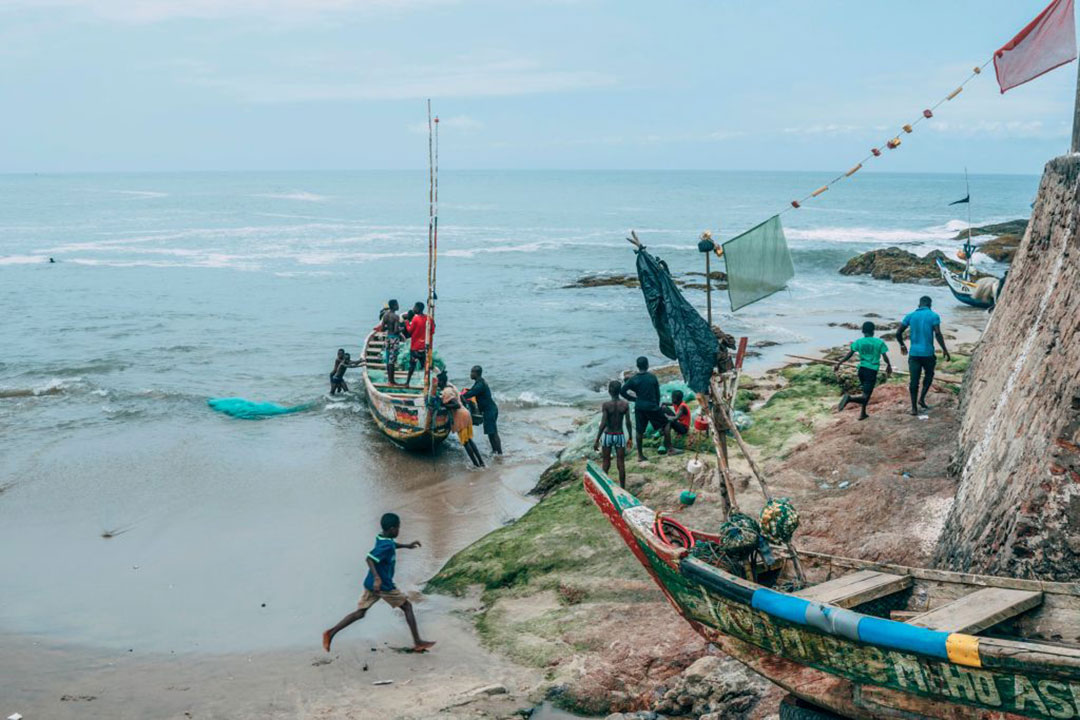Overfishing Leaves Ghanaian Fishermen with ‘No Means for Survival’
ADF STAFF
Under overcast skies, Ghanaian fishermen in a wooden canoe strained to haul in their fishing nets through choppy waters 17 kilometers off the coast.
Despite hours of struggle, their nets were mostly empty.
“I am not happy at all today,” Nana Kwentsiar, a fisherman from the coastal village Elmina, told broadcaster Deutsche Welle (DW). “We didn’t get [as much] fish as we were expecting.”
Due to illegal overfishing by foreign industrial trawlers, mostly from China, Ghana’s fish stocks are in steep decline. Its small pelagic fish populations, such as sardinella, have dropped 80% in the past two decades. One species, sardinella aurita, already is fully collapsed.
Kwentsiar, who has been fishing since age 13, told DW that it’s hard to stay in business.
“Feeding the crew and fueling the canoe has become a debt for me,” Kwentsiar said. “We sometimes go fishing for two weeks, and we don’t catch anything. But because it’s our profession we can’t stop. The main problem facing the fishing industry is the activities of Chinese vessels.”
An investigation by the Environmental Justice Foundation found that 90% of fishing vessels operating in Ghana are owned by Chinese companies, often operating through front companies. The country loses $50 million a year through opaque arrangements with foreign companies, the foundation found.
China, which commands the world’s largest distant-water fishing fleet, has targeted West African waters for decades. It is also the world’s worst illegal, unreported and unregulated (IUU) fishing offender, according to IUU Fishing Index.
The results in Ghana have been catastrophic.
Ghana’s marine fisheries support more than 2.7 million people — almost 10% of the population. More than 100,000 fishermen and 11,000 canoes operate in the country, but average annual income has dropped by as much as 40% per artisanal canoe in the past 15 years, according to the foundation.
“If the industrial vessels fishing in our water are controlled, the industry can recover,” Kwentsiar told DW.
The lack of fish has caused prices to soar, leading to food insecurity and loud arguments at fish markets.
“We have no profession besides fishing,” Ama Sam, a fish seller in Elmina, told DW. “At the moment, our children can’t attend school. We only have a job if the fishermen catch enough fish. That is how we are able to take care of our children. But at the moment there is no means of survival.”
The European Union in May issued Ghana a “yellow card” after concluding that the country’s level of development and engagement against IUU fishing was inadequate. A yellow card is a warning that sanctions may be imposed if the country does not improve efforts to halt IUU fishing.
Ghana responded by requiring companies operating there to reapply for fishing licenses to continue. The government also announced plans in mid-September to review licensing loopholes that let foreign fishing companies operate illegally.
In response, Ghana’s Fisheries Commission gave notice that companies operating in the country’s trawl fishing industry must reapply for fishing licenses to continue working in its waters.
To help preserve fish stocks in West Africa, Ghana in December urged neighboring countries to implement coordinated closed fishing seasons. The same month, Ghana signed a pact with Benin and Togo to implement a joint fisheries observer program aimed at reducing IUU fishing in the region.
In February, President Nana Akufo-Addo announced that Ghana is implementing a National Plan of Action to curb IUU fishing. The plan includes ways to more effectively certify fish catches and improve port and beach inspections, as well as sea patrols, according to a report by Business Ghana.
“We are completing work on our Ocean Governance Study and putting in place the requisite structures and processes to ensure that we complete our Sustainable Ocean Plan by 2025, as prescribed by the High-Level Panel on the Ocean Economy,” Akufo-Addo said.


Comments are closed.